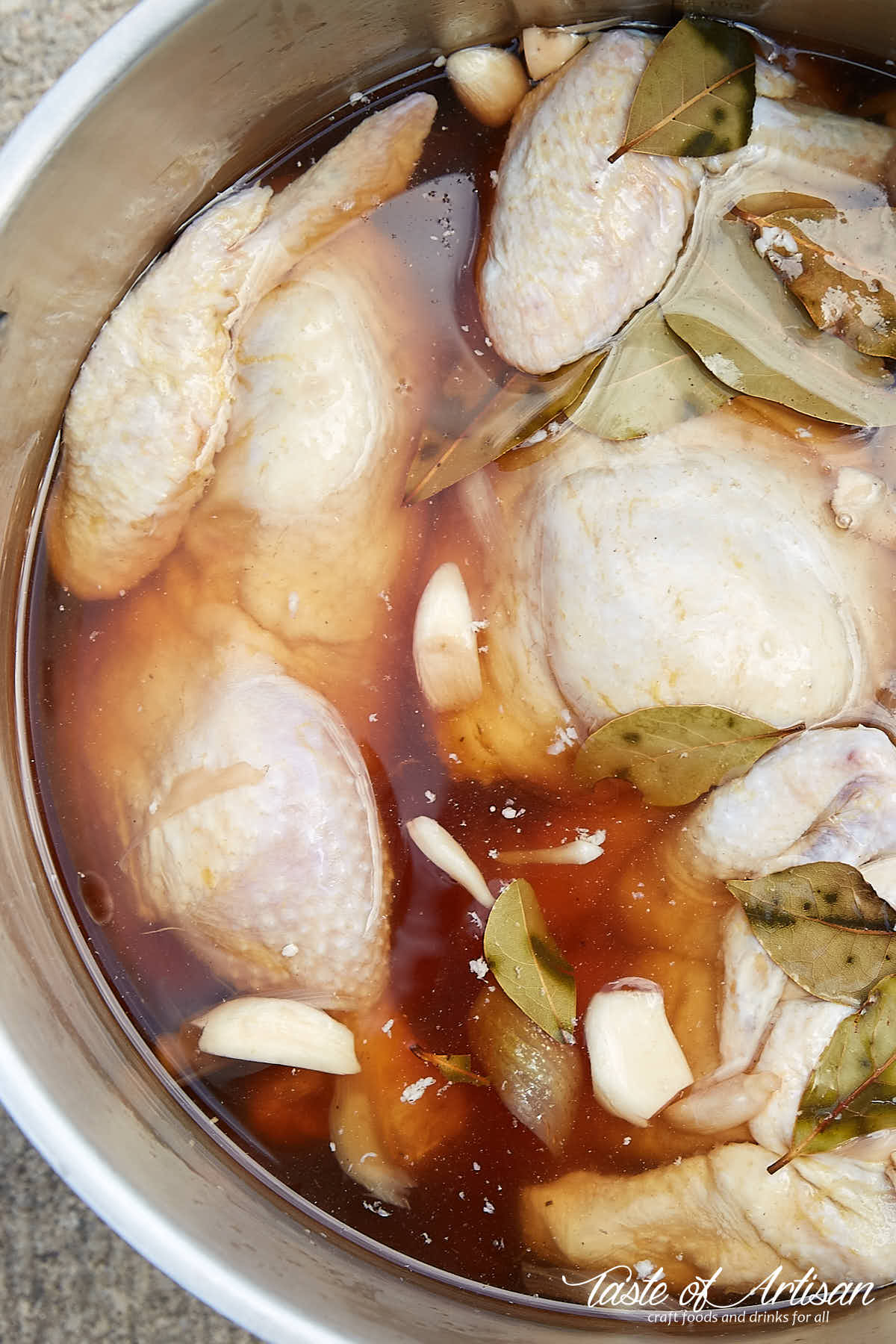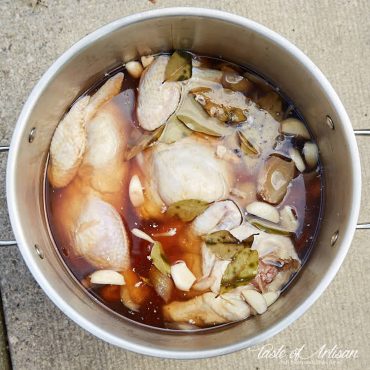Most meats when overcooked will have an inferior texture and taste. This is especially true with the lean chicken breast meat. Fortunately, soaking chicken in brine will help to achieve a moister and juicier product.

What is brine?
At its core, a brine is a strong solution of water and salt. To give the brine more flavor sweeteners (such as brown sugar, maple or corn syrup, molasses, etc.) and spices are usually added.
What does brine do to chicken meat?
The verb "brine" means to treat with or steep in brine. The salt has two effects on poultry: "It dissolves protein in muscle, and the salt and protein reduce moisture loss during cooking. This makes the meat juicer, more tender, and improves the flavor. The low levels of salt enhance the other natural flavors of poultry."
Another benefit of brining chicken is that it allows even flavor distribution. If you just rub chicken meat with spices or put sauce on it, it will be flavorful on the outside, but bland on the inside. Brining makes meat have the same flavor from surface to center. Brining is also known to improve browning of the chicken meat.
Making the chicken brine
Echoing USDA's guidelines on brining, Stanley Marianski in his well-known book titled Home Production of Quality Meats and Sausages recommends the following brine formula:
A typical brine solution (no Cure #1 added)
- 1 gallon of cold water
- ¾ cup of salt
- 3 oz (85 g) sugar (brown or white)
A typical brine solution (with Cure #1)
- 1 gallon of cold water
- ½ cup (146 g) of salt
- 3 oz (85 g) of Cure #1 – corresponds to 79 g of pure salt
- 3 oz (85 g) sugar (brown or white)
Note: Cure #1 is required for brining products that will be smoked at low temperatures (below 200F) as it inhibits the growth of harmful bacteria. Cure #1 is also called Insta Cure #1 or Pink curing salt #1. It contains 6.25% sodium nitrite and 93.75% table salt. Sodium nitrite provides the characteristic flavor and pink color associated with curing.
To prepare a brine dissolve salt in cold water by mixing it thoroughly (salt dissolves much faster in hot water than in cold water). Cover and refrigerate before adding the chicken.
The above formulas are a good start, but they lack in flavor. My improved formula for chicken brine inevitably includes vegetables and spices to add complex flavor to the otherwise bland chicken meat, especially the breast meat. The chicken brine recipe below is what I have been successfully using and perfecting over the past 10 years. It's exceptionally flavorful and reminds me of a tasty homemade chicken stock.
Poultry Brining Time
Brining time depends on the size of the product. Stanley Marianski's , a well-known authority on the subject of smoked meats and sausages, recommends the following brining times for poultry:
Cornish Game Hens 1 - 2 hours
Chicken Pieces 2 - 4 hours
Whole Chickens (2 lbs.) 1 day
Whole Chickens (4 lbs.) 1 - 2 days
Turkey Breast 4 - 8 hours
Whole Turkeys (up to 10 lbs.) 1 - 2 days
Whole Turkey (over 10 lbs.) 2 - 3 days
It is safer to brine on the low end of the time range on the first attempt and keep notes for future reference as it's easy to fix an under-salted product than over-salted one. You can always brine longer the next time if required.
Be especially careful when brining chicken wings. I find that wings need no more than 1 1/2 hours. Longer brining makes them too salty.
Safety considerations
Brining should be done at a refrigerator temperature (below 40F), with the starting brine temperature also being below 40F.

Improved Chicken Brine Recipe
Ingredients
- 1 gallon water ice cold
- ¾ cup kosher salt (219 g)
- 3 oz sugar (85 g); brown or white
- 2 large carrots peeled and cut into pieces
- 2 medium onions peeled and cut into pieces
- 8 cloves garlic peeled and cut in halves
- 3 bay leaves
- 1 Tbsp black peppercorns
Instructions
- To prepare the brine, bring 1 quart of water to boil, add salt and sugar and stir to dissolve. Add chopped vegetables and spices and remove from heat. Cover and let cool. Mix with the rest of the water and refrigerate to cool below 40F before adding the chicken.
- Add the chicken an brine in a refrigerator according to the table above.
- After brining, rinse the chicken in cold tap water for 5 minutes to remove any crystallized salt from their surface, then leave it to drain.
Dry chicken brine
Brine does not have to be liqiud. Dry brining is simple yet just as effective alternative to traditional wet brining methods. Dry brining involves seasoning the meat with salt and spices and refrigerating for two days. This two day process drains moisture out of the poultry, creating a flavorful brine, which is then reabsorbed into the meat without adding additional water.
Poultry is typically brined by a wet method as it is very easy to end up with a product that is too salty. My solution for dry brining is to use the exact amount of salt that is needed to make the meat perfectly salted. This way the chicken meat will never get over-salted. Let's say I am going to brine 4 lbs of chicken breasts. My definition of perfectly salted meat is 6 grams (1 heaping teaspoon) of kosher or sea salt per pound of meat. With that in mind, I will dry brine my chicken breasts by rubbing them with exactly 4 heaping teaspoons of kosher salt.


Celine says
Hello, this is the first time for me to brine chicken. I have made a whole gallon for 2 whole chicken breast. I figure i have made to much. Is it possible to freeze the unused portion of the brine for another recipe? Thank you for your recipe.
Celine
Victor @ Taste of Artisan says
That's a good question. I don't know for sure, but I don't see a problem with freezing the brine for using later. One you thing you should never do is re-use used brine as the salt level in it will be changed, which will impact the brining. But freezing should be just fine.
Leah says
Hello!! Will this method also work with beef?
I am also wondering if this recipe is keto friendly because it has sugar in it. Do you know the calorie/carb count for this recipe?
It looks amazing and I'm really excited to try it 😻
Victor @ Taste of Artisan says
Leah, this is a brine recipe for poultry but I don't see why it wouldn't work for beef. Though, I love using a different brine/marinade for beef, you can find it in my Smoked Brisket recipe. That one has no sugar in it. Speaking of which, you can always omit the sugar in the chicken brine recipe. It's hard to calculate calories/carbs for brined meat as absorption of salt and sugar in the meat will depend on temperature, time, etc. Most of the brine will be discarded and how much is retained by the meat will be hard to estimate. Good luck!
Suz says
Incredible chicken. This brine recipe is amazing!
Victor @ Taste of Artisan says
Enjoy!
Amy Baker says
This is now our go to recipe for brining poultry! We had just been baking/roasting bone-in chicken breasts with dry rub on the outside, with a good sear in olive or avocado oil prior to baking. The exterior meat and skin were so tasty but the rest of the meat was blah. Your brine recipe has totally changed things for us and we now truly enjoy absolutely delicious chicken or turkey every single time. Thank you Victor!!!
Victor @ Taste of Artisan says
Glad to heat it, Amy. Brining does change poultry eating experience. So worth it. Enjoy!
Kristy Winegardner says
First time brining anything and found this recipe. We did chicken breasts and they were fantastic! Not dry or salty which was a concern that always prevented me from brining anything. Saving this recipe and sharing! Thank you so much!
Victor @ Taste of Artisan says
You are very welcome. Enjoy!
Tom says
Thanks so much for the detailed instructions. My very first brined chicken came out perfectly seasoned. Cheers.
Victor @ Taste of Artisan says
Glad my post helped. Happy cooking!
Mae says
Good post. I learn something totally new to me. Tried brining my chicken for the first time and it turned out great.
DJC says
What is "Cure #1?"
Victor @ Taste of Artisan says
Update the post with that info.
Keri says
Very helpful, thank you!
Victor @ Taste of Artisan says
You are very welcome.
Cathy says
Thank you for the extensive amount of information! I want to brine and smoke chicken wings for dinner tonight. Some recipes require 12 hours brining, plus 4 hours drying, a good two day process. I love my smoker barbecue, always provides good flavour, just want to add a little more tonight. I’ll leave a comment on how they turned out. Thank you!,
Victor @ Taste of Artisan says
Good luck! Using my brine, I brine wings for no longer than 1-2 hours. Any longer than that and they will be too salty.
Dean Harris says
Hello Victor. Like you, I bring clean water to a boil prior to adding the salt, sugar, and other ingredients. To me, it's the only way to ensure the distribution of salt, sugar, as well as imparting aromatics. Lately, I've been questioning if thighs and legs need brining at all, being that they have more natural juice and fat. Have you worked at all with brined spatchcocked chicken breast? I think this is the direction toward what I am trying to achieve, and maybe brining for 12 hours. What are your thoughts? Dean
Victor @ Taste of Artisan says
Hello Dean,
You are right, chicken drumsticks, thighs and wings don't necessarily need brining. Brining will add taste and flavor inside the meat though. But they will be juicy without brining.
Chicken breast does benefit from brining for sure. 12 hours may be too long but of course it will depend on the size... For example, with this recipe of the brine, I find that whole broilers and fryers only need about 4 hours, so I'd shoot for 2 - 2.5 hours for a whole breast. Less for bone-in, skin-on half breasts. Even less for boneless and/or skinless.
If we are talking roasting and stewing chickens of 5-7 lbs, their full breast would need more brining but I still wouldn't go as long as 12 hours to be honest. I'd start with 4 hours, 5 tops. You can't unsalt a salty chicken breast.
Garry says
Very good your recipe
Living on a beach in Australia we always brine in seawater it free and fun to collect with seaweed for garden and dry to make seaweed butter
Victor @ Taste of Artisan says
Enjoy! Never heard of brining in seawater but sounds pretty interesting.
Kim says
I will no longer cook chicken without using your brining recipe! It’s spectacular! The flavor is wonderful while keeping the chicken moist. It is well worth the preparation. Many thanks for sharing your recipe!!
Victor @ Taste of Artisan says
You are very welcome. Happy cooking!
Martha says
I was going to make your crispy oven chicken breast. Can I brine the chicken breasts on one day and then cook them the next?
Victor @ Taste of Artisan says
Hi Martha, yes, you can do that. Brine for the recommended time, remove from the brine, pat dry and refrigerate.
JD says
Your brining recipes are very good. Maybe a little more work than I traditionally do, but you're the chef, right? I always brine my chicken breasts. And, to save time I just whisk the salt into the water vigorously to dissolve it and into the refrigerator.
Victor @ Taste of Artisan says
That'll do to. Salt and water is all you need. Maybe some sugar to take off the edge from the salt.
Jim Durrett says
Hey, you triggered a question I have pondered over. Once you salt brine something, do you recommend rinsing it before cooking, and would you still salt the meat if called for in cooking? I still go ahead and salt, but what do you say. Thanks for your kind comments.
JD
Victor @ Taste of Artisan says
Hi Jim,
I normally don't rinse meat after brining or even after dry curing (like bacon or capicola for example). I simply pat dry the meat with paper towels or scrape off any excess salt/seasonings (if dry curing). Rnsing and even light soaking in water is good when you dry brine or dry cure in excess salt otherwise the surface will be too salty. Like you, I do add a little bit of salt after brining, smoked chicken breast is a good example I recently posted.
Bill says
Why is there an edge from the salt. The sugar is only masking the taste from the salt. Does wet brining make chicken taste too salty. Probably not good for a low sodium diet
Victor @ Taste of Artisan says
Bill, you can control how long chicken spends in the brine thereby controlling the amount of sodium that gets in it. Frankly, I've never had a salty chicken made this way, the only time it was obvious is when I brine a whole chicken where the chicken tastes good everywhere but the wings - those tend to taste salty as they need a lot less of brine time.
neng says
thank you
Jay says
Brining makes a huge difference. Love this brine, very good flavors. I also added a little bit of celery and fresh parsley to the mix.
Chuck (Charles) Payne says
Did your basic brine last night. Absolutely love it. Even over cooking results in a tender close grained chicken breast that is tender beyond imagination.
The first one I did with my flavor wave was perfect. Juicy, tender with just the basic chicken flavor. Will repeat the with the improved. Thank you for posting.
-Chuckwagon Seasonings
Victor @ Taste of Artisan says
You are very welcome, Chuck. Glad to hear that and thanks for posting your feedback here.
Dan R Cassidy says
how many breasts will this brine?
victor says
Dan, that's a very good question. I've never seen anywhere where it would talk about how much brine you need per specific amount of meat. Personally, I always go for the optimum amount of brine to cover all the meat. For example, for 4-8 regular size chicken breasts I normally make half the recipe given here, or 1/2 a gallon. I put the breasts and the brine in a large Ziploc bag and squeeze most of the air out. That does the trick. When I brine a couple of chickens, or a turkey, I make a full gallon of brine.
Kathryn says
Amazing! And so flavorful!
Ashley says
I’m assuming you would just cut the brining recipe in half if your only going to be bringing like two skin on bone in chicken breasts hey?
victor says
Yes. When brining, I make sure I have all the meat covered with brine, that's all.
Silver W says
Lovely. I utilized the "un-bringed" version of baked chicken. Followed your directions for a large, split-breast and left the skin on as it gave a really crispy finish. Perfect on the suggested coking temperature and resting time. So delicious, great recipe, thank you!
victor says
Great to hear. Glad it helped.
Hal Connaughton says
Hi. If I want to poach my chicken breasts after the improved solution, do I have to use fresh aromatics again? Will the flavor be to intense if I do because they were already used in the brining process?
victor says
Hi, I would definitely add a little seasoning on top if poaching. Probably best to try one first and then season the rest.
Robert Toree says
How much kosher salt do I use for the improved version?
victor says
¾ cup or 219 g of kosher salt
suzanne says
Tried this for the 4th, WOW this was good!
victor says
Thank you for the feedback. This has been my go-to brine recipe for many years.
Ken Kraus says
I brine almost all my meats.
Joe says
I tried your chicken improved brine. I cooked chicken thighs on my outdoor rotisserie and they were smashing! Thank you for sharing.
victor says
You are very welcome and thank you for your feedback.
Vicki says
I have found brining to be totally worth the extra preparation/time.
victor says
Totally! I even brine chicken wings. It helps all the flavors get deep inside the meat which makes it more enjoyable to eat.